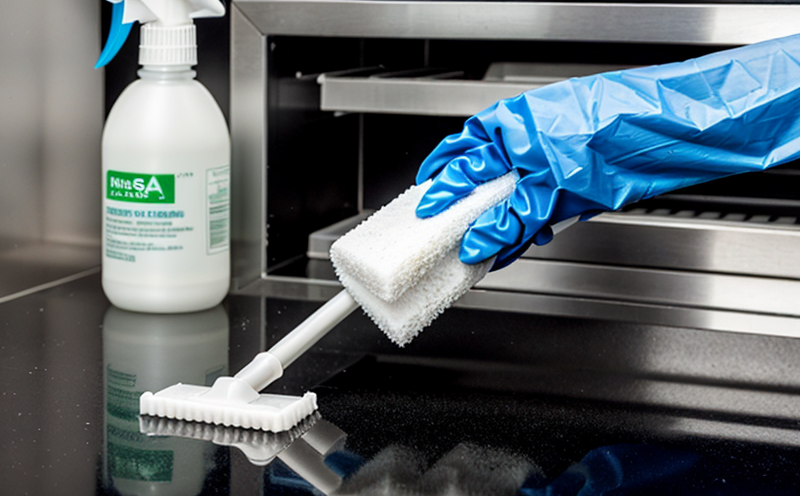JIS Z 2801 Antimicrobial Activity Testing of Hygiene Plastics
The Japanese Industrial Standard (JIS) Z 2801 is a comprehensive set of guidelines for evaluating the antimicrobial activity of hygiene plastics. This testing ensures that materials used in applications such as food contact surfaces, medical devices, and personal care products effectively inhibit microorganisms without compromising safety or functionality.
Antimicrobial activity tests are critical to meet regulatory requirements and ensure consumer safety. The JIS Z 2801 standard specifies procedures for determining the efficacy of antimicrobial agents on various plastic substrates. It addresses not only the initial killing rate but also the persistence and long-term effectiveness of these treatments.
The testing process involves exposing the plastic sample to different bacterial or fungal strains, followed by quantitative assessments using culture methods or ATP bioluminescence tests. The results are compared against control samples to determine the antimicrobial efficacy. This ensures that the product maintains its hygienic properties over time and under various environmental conditions.
The significance of such testing extends beyond mere compliance; it also enhances brand reputation by demonstrating a commitment to quality and safety. For R&D engineers, this standard provides a clear framework for developing new materials or improving existing ones with antimicrobial properties. Quality managers and procurement officers can leverage these test results to make informed decisions about supplier selection and product performance.
The JIS Z 2801 methodology is particularly relevant in the healthcare sector where hygiene is paramount, but it also applies across various industries dealing with food safety, pharmaceuticals, and consumer goods. By adhering to this standard, manufacturers can ensure their products meet stringent international standards for antimicrobial activity.
The testing protocol includes several key steps: selection of appropriate microorganisms, preparation of the plastic specimens, application of the antimicrobial agent, incubation period, and final evaluation. Each step is meticulously controlled to minimize variables that could affect the outcome. The use of advanced analytical techniques ensures accurate measurement of microbial reduction rates.
For comprehensive testing, laboratories equipped with state-of-the-art facilities are essential. Our laboratory adheres strictly to JIS Z 2801 protocols using high-precision instruments and experienced technicians. We offer tailored solutions for clients seeking detailed reports on antimicrobial performance, including recommendations for optimizing product design or formulation.
In summary, the JIS Z 2801 standard is a cornerstone in ensuring hygiene plastics meet rigorous international standards. By adhering to these guidelines, manufacturers can enhance trust and satisfaction among consumers while complying with regulatory expectations. Our laboratory’s expertise guarantees reliable, reproducible results that validate product safety and efficacy.
Benefits
The implementation of JIS Z 2801 antimicrobial activity testing offers numerous advantages to manufacturers and consumers alike:
- Regulatory Compliance: Ensures products meet stringent international standards, facilitating market entry.
- Enhanced Safety: Provides peace of mind by verifying that materials effectively reduce harmful microorganisms.
- Informed Decision-Making: Offers detailed insights into product performance for R&D and procurement teams.
- Consumer Trust: Builds confidence in brands through proven efficacy and safety.
- Sustainability: Promotes the development of eco-friendly materials that are both safe and effective.
- Competitive Advantage: Differentiates products in a crowded marketplace by offering superior hygiene solutions.
The benefits extend beyond mere compliance, fostering innovation and continuous improvement in product design and formulation.
Customer Impact and Satisfaction
For customers, the outcomes of JIS Z 2801 testing have a direct impact on their daily lives. By ensuring that hygiene plastics meet stringent international standards, these tests enhance safety and reliability in everyday products.
Consumers can expect safer food contact surfaces, more hygienic medical devices, and better-performing personal care items. These benefits translate into greater trust and satisfaction with brands that prioritize product quality and safety.
The testing process not only meets regulatory requirements but also sets a benchmark for excellence in hygiene plastics manufacturing. This commitment to quality builds long-term relationships between manufacturers and their customers, fostering loyalty and repeat business.
Moreover, the availability of detailed reports allows consumers to make informed choices based on verified data. This transparency strengthens trust in brands and contributes to overall market confidence.
In summary, JIS Z 2801 testing enhances customer satisfaction by delivering products that are safer, more effective, and aligned with global standards for hygiene plastics.
Use Cases and Application Examples
| Application | Tested Products | JIS Z 2801 Criteria Met | Expected Outcomes |
|---|---|---|---|
| Food Contact Surfaces | Bowls, plates, cutting boards | Antimicrobial efficacy over time | Reduced risk of foodborne illnesses |
| Medical Devices | Surgical drapes, catheters | Persistence and effectiveness of antimicrobial agents | Minimized infection risks during medical procedures |
| Personal Care Products | Toothbrush holders, razors | Efficacy against common pathogens | Enhanced hygiene in daily personal care routines |
| Baby Bottles and Accessories | Bottles, pacifiers | Durable antimicrobial protection for infants | Safe environment for young children |
| Sanitary Napkins and Tampons | Hygiene products with antimicrobial properties | Persistent efficacy against bacteria and fungi | Optimized absorbency and hygiene in use |
| Recreational Equipment | Golf clubs, tennis rackets | Improved grip and performance in wet conditions | Enhanced user experience in various environments |
The table above illustrates how JIS Z 2801 testing can be applied across different sectors to ensure hygiene plastic products meet rigorous international standards. Each application focuses on specific criteria to address unique challenges and enhance product performance.
For instance, in the food contact surfaces category, the test ensures durability of antimicrobial properties over extended periods, thereby reducing the risk of cross-contamination. Similarly, in medical devices, it guarantees consistent effectiveness against pathogens throughout their lifecycle. These examples highlight the versatility and importance of JIS Z 2801 testing across diverse industries.





